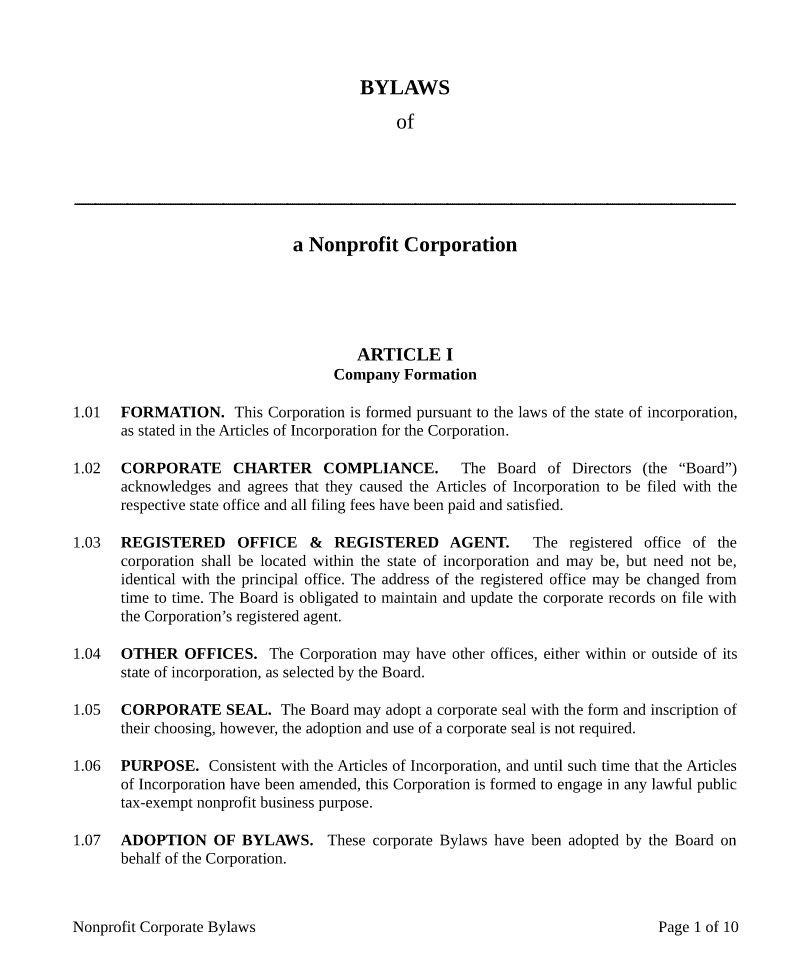Washington DC Nonprofit Bylaws
Washington DC nonprofit bylaws are the operating manual for governing your organization. Your bylaws guide your board of directors through decisions about organizational processes such as holding meetings, managing board members, keeping records, and handling conflicts of interest. Bylaws help prevent and solve problems by clearly describing the rules and expectations regarding your nonprofit’s procedures and members’ rights.
Although Washington DC law contains some requirements and suggestions for what to include in your bylaws, you can craft a document adapted to your nonprofit’s specific needs. Get started with our attorney-drafted nonprofit bylaws.
Why Does a District of Columbia Nonprofit Need Bylaws?
The importance of having effective bylaws for your District of Columbia nonprofit cannot be overstated. While you do not need to file your bylaws with the district like you do your Washington DC Articles of Incorporation, you do need to create and keep your bylaws on file.
1. Nonprofit bylaws are legally required in the District of Columbia.
District law states that either the incorporators or initial board of directors named in your nonprofit’s articles of incorporation “shall hold an organizational meeting … to complete the organization of the nonprofit corporation,” which includes “adopting bylaws” (DC Code § 29–402.05). In this context, “shall” means that the act of adopting bylaws is legally required.
2. Third parties will ask to see your bylaws.
Most notably, if you want the IRS to grant 501(c)(3) tax-exempt status to your nonprofit, you’ll need to attach a copy of your bylaws to your application. You’ll also have to share copies of your bylaws when opening a bank account, buying or renting offices, and applying for funding and grants.
3. Nonprofit bylaws allow you more control over your nonprofit.
Even if the District of Columbia didn’t legally require adopting bylaws, we would still recommend doing so. Your bylaws spell out how your nonprofit will be managed and operated, protecting your organization in several ways. For example, bylaws can preclude and resolve disagreements between board members or conflicts of interest. They can also direct your members on how to proceed during crises. Additionally, they help defend your nonprofit from directors acting in bad faith by holding them liable for breaching their contract. Without bylaws, your nonprofit can be left vulnerable in difficult situations.
Want to learn more? Check out our Guide to Nonprofits.
What Do Washington DC Nonprofit Bylaws Include?
The bylaws for your Washington DC nonprofit should contain fundamental information about your nonprofit and set forth its specific internal operating rules. The first part of your bylaws should include facts like your nonprofit’s name, address, purpose, and registered agent. The rest of your bylaws should lay out the guidelines for:
- adding or removing board members
- giving notice and holding board meetings
- taking a vote and meeting quorum requirements
- handling conflicts of interest
- compensating directors
- keeping records
- amending the bylaws
- operating during emergencies
- dissolving the nonprofit
You can tailor your bylaws by adding any provisions you’d like as long as those provisions don’t contradict the law or your articles of incorporation.
Are nonprofit bylaws legally binding?
Yes. Your bylaws are a legally binding contract that your nonprofit members must obey. If someone on your board of directors, one of your officers, or an employee breaks that contract, there could be adverse legal consequences—not only for the individuals involved but also for your organization as a whole.
Are nonprofit bylaws public record?
Typically, yes, though it varies from nonprofit to nonprofit. Any nonprofit that requests 501(c)(3) tax-exempt status with the IRS will have its bylaws on the public record. The IRS requires 501(c)(3) applicants to include copies of their bylaws with their applications, and the IRS makes all applications public. Many nonprofits also make their own bylaws public to gain the trust of donors, beneficiaries, and supporters with a show of transparency.
FAQs
It isn’t legally mandated for your board of directors to sign your bylaws, but it is common practice. When your directors sign your bylaws, they demonstrate that everyone involved in the formation of your nonprofit is committed to upholding its vision and operational integrity.
Yes. Your bylaws can be changed and should include a provision for making amendments. We suggest reviewing your bylaws regularly to ensure that they accurately reflect how your nonprofit functions.
Your initial directors or incorporators establish your bylaws at your nonprofit’s first organizational meeting meeting (DC Code § 29–402.05).
